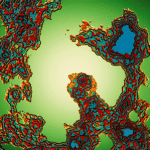Swiss researchers at Geneva University Hospitals decided to use cannabinoids to help ten patients with severe dementia.
They took a 2:1 extract of CBD and THC, titrating patients up to about 20 mg CBD and 10 mg THC per day. The oil extract was infused into cake to make it more palatable to the seniors, and the dose was split across three meals a day. Two months into treatment, half the seniors had eliminated other drug use, including morphine, benzodiazepines, and antipsychotics. This reduction in pharmaceutical use, along with the direct activity of the cannabinoids, dramatically reduced behavioral problems and the rigidity that accompanies dementia. Patients were monitored for up to five months, and the beneficial effects appeared to persist unabated. Previous research hasn’t always shown beneficial effects of THC in dementia, so why was this group different? Well, other studies tried to use pure THC (in the form of Marinol, for example). Pure THC is not particularly pleasant, and generally patients can only tolerate low doses. But as part of a less refined cannabis extract, a higher dose of THC could be taken without ill effect. The reaction of the patients’ families was “astonishingly positive,” according to the authors. Although this was only a small pilot study, comprising ten individuals, it suggests that cannabis can be used safely and effectively in people with severe dementia.
Read study: Prescription of a THC/CBD-Based Medication to Patients with Dementia: A Pilot Study in Geneva
Adrian Devitt-Lee is a research scientist and longtime Project CBD contributor. © Copyright, Project CBD. May not be reprinted without permission.







